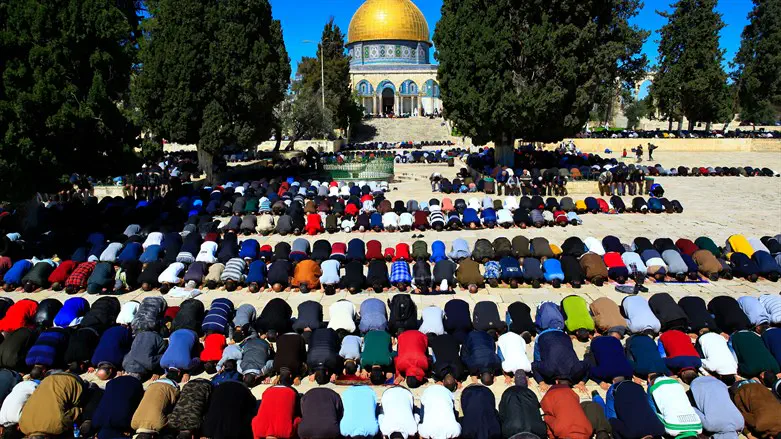
Police are on the highest level of alert ahead of Muslim prayers tomorrow, the first Friday prayers to fall during Ramadan this year. Over one hundred thousand Muslims are expected to visit the mosques on the Temple Mount this week.
Two years, the Temple Mount was closed for public prayers due to the coronavirus epidemic; last year, the number of worshipers permitted to enter was restricted due to Operation Guardian of the Walls.
According to a report in Israel Hayom, by the last week of Ramadan, a quarter of a million Muslims are likely to visit the mosques for Friday prayers. The increased numbers this year are partly due to a decision made by the security establishment to permit entry to Palestinian Arabs; women, children, and men over the age of 50 are to be granted free entry without a special permit.
Generalized warnings regarding terrorist attacks are received all the time, but currently there are also specific warnings. "The central threat is that of hostile terrorist activity," said deputy police commissioner Sami Marciano. "We are preparing for scenarios involving a lone terrorist, and vigilance is extremely high."
Police do not have a specific profile for an attacker, Marciano added. "There's a broad range of possible attackers, which means that we have to suspect everyone. Suspect everyone, on the one hand, but also treat everyone with respect."
Meanwhile, in recent days police and the GSS have made several arrests of suspects who gave indications that they intended to perpetrate terrorist attacks. Some were apprehended within Jerusalem, others on the outskirts of the city, and still others before they reached the capital.
Police reinforcements are being sent to Jerusalem's Old City and specifically the area around Damascus Gate - both regular police and undercover units - in light of recent disturbances at Damascus Gate, and due to concern that a recent string of terrorist attacks is likely to prompt a worsening of the security situation. So far, only relatively minor disturbances have occurred.
"The main lesson we've learned this year is to make a distinction between the normative population that wants to celebrate Ramadan and those who want to disrupt things," Marciano said. "That's not to say that in previous years we didn't make such a distinction, but things have been more explosive in the past and when that happened, it was hard to maintain control. This year, we've made better preparations; we've talked with local merchants and with leaders. We're adopting a more restrained approach, but if we do detect any disturbances, we will clamp down hard."
Deputy commissioner Ronen Hazut added that this year, the climate is less intense. "Local merchants tell us that they're fed up with the young hotheads disturbing the peace, and that they've asked them to stop."

